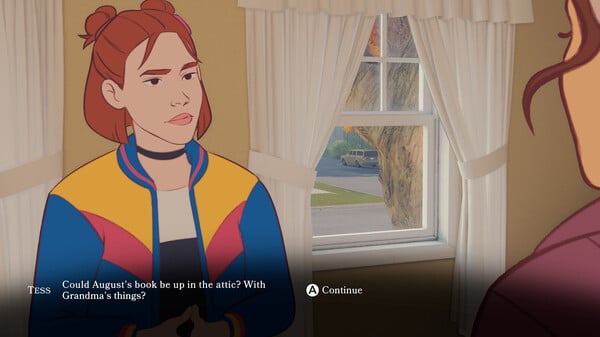The family road trip is a potent framing device for any story. In a car, there’s no privacy, no escape from the other folks in the car with you. Silences grow awkward, charming tics become annoying, conversations veer into uncomfortable territory, and every stop is a chance to either reset back to zero or litigate the issues that have come up.
I went into Open Roads – a game about a road trip – hoping for a story that would dig into the very specific feelings that a family road trip can evoke, and provide an interesting story along the way. Unfortunately, Open Roads is just a little too flimsy an experience to really tap into anything special.
Open Roads is a game about an American mother and daughter, Opal and Tess, going on a short road trip. It’s 2003, and Opal’s own mother, a well-respected advice columnist has just died. Opal and Tess had been living with her following Opal’s separation from Tess’ father, but they’re now preparing to sell the home and find somewhere new to live.
Tess, a 16-year-old with a burgeoning dream to be a web designer, convinces her mother to travel beyond the Canadian border after discovering evidence suggesting that Grandma may have had a secret love affair following the death of her husband. This premise, which unfurls in the game’s opening, is very compelling – the prospect of uncovering a family mystery is always exciting to me.
As Tess, the player explores five small spaces (including the car’s passenger seat that you’re buckled into during some brief driving sequences), reads a bunch of letters, and pieces together some family history while making a handful of dialogue choices.

While the environments are in full 3D, the two characters are animated in 2D over them during cutscenes – an interesting, sometimes jarring effect. The whole thing wraps up in about three hours – typically a good length for this kind of game, but by the time the credits rolled I was surprised that I’d apparently seen the whole story.
Much of the Open Roads development team previously worked on Gone Home, an excellent game about a not-haunted-but-kinda-haunted family home. Open Roads is, like that game, about exploring family living spaces and coming to grips with the stories those spaces tell.
But Open Roads spreads its story across homes that are being packed up or abandoned, where every item left behind feels weirdly abandoned; the artifice of these objects as video game objectives is all too clear. It’s not entirely fair to view this game in the shadow of another, of course, but it’s difficult not to make comparisons – the games really are very alike,
Part of the issue here is that the story, such that it is, kind of fizzles – I won’t spoil anything, but the truth of every secret and turn in the plot ended up being less interesting than I anticipated. Opal is played by Keri Russell and Tess by Kaitlyn Dever, two tremendous actors, both of whom acquit themselves well and draw out more from their characters through their performances.
But the sound-mixing in the game makes it clear that the two actors were never in the same room together – a common issue in games, perhaps, but it feels greatly exacerbated by how much of the game is about their conversations. Those conversations are often pleasant, and sometimes confronting, but for my money they never quite cohere into a compelling relationship. Both Tess and Opal are a little too jokey in every conversation.
Read: ‘Open Roads’ development team officially splits from Fullbright
The dialogue choices you make really do impact the way scenes play out – picking one option over another might open up a very different script – but the story itself is fairly linear, and if the characters have an argument it may feel forgotten in the next scene. I liked Tess and Opal by the end, but I did not feel richer for having met them or experienced their story.
The areas you explore feel far more like video game levels than real locations. When you visit an old family summer home, it becomes clear that you’re going to need to search high and low for keys, and artificial blockers pop up all over the place.
You need to walk – very slowly – through each location, finding items that Tess and Opal can discuss, to move on, and the whole time it feels like the game is building to something bigger… until it promptly ends. The prop designs, at least, are incredible – every printout you can pick up and read, every old letter or card, every mug or vase or DVD case that you can pick up and examine, has been made with absolute commitment to the time period.
Seeing an authentic print out of an email hit me with a weird wave of nostalgia. But that can only carry the game so far, and by the final level there are fewer of those incidental, nostalgic details to enjoy.

I gave myself a day between finishing Open Roads and writing this review, which was enough time for most of the game to slough out of my brain as though I’d never played it at all. The only thing left behind was a vague sense of having been a little annoyed the last time the game asked me to focus my energy on hunting down a tiny key hidden somewhere in a building, which is what most of the game’s traversal puzzles boil down to.
The big final reveal of the game – which the characters figured out a step behind me, even though I am usually very bad at picking twists – is treated as cursory and underwhelming by the characters in a way that makes it difficult to care about.
Here’s the thing: I love walking simulators, and I love story games, and there are complaints and issues I’m listing here that I have absolutely overlooked or brushed aside in other, similar games. But there is something about Open Roads that doesn’t quite hang together.
It has the aesthetics of some big themes and ideas, but it does not feel real. More like it wants to feel real. You have good characters, acted well, a strong sense of style, and a great attention to detail – but the game lacks a sense of purpose, which is really vital for a meditative game about walking and exploring.
After over a decade of AAA games about sad dads, seeing more games about mothers and daughters is welcome and exciting. And if there’s one bigger positive I can spin from finding Open Roads a little boring, it’s that I don’t feel the need to shrug and say “at least it’s trying something a bit different” or to tamper my criticism.
Broadly speaking, it still is doing something a bit different compared to most games, but just last year indie titles like Venba,Thirsty Suitors, Saltsea Chronicles and A Highland Song gave us interesting, unique stories about familial relationships between mothers and their children.
This isn’t to be glib and say “we have enough of these now, thank you” – I desperately want more games like this, across different genres and budget levels, covering more stories and perspectives and gameplay models.
The mere fact that Open Roads does not feel like an exciting new perspective for a game to offer is weirdly encouraging – and perhaps, for some players, this will tap into something in their lived experience that makes it all the more compelling. But Open Roads simply isn’t a road trip that everyone needs to take.
Two stars: ★★
Open Roads
Platform(s): PlayStation 5
Developer: Open Roads Team
Publisher: Annapurna Interactive
Release Date: 29th March 2024





